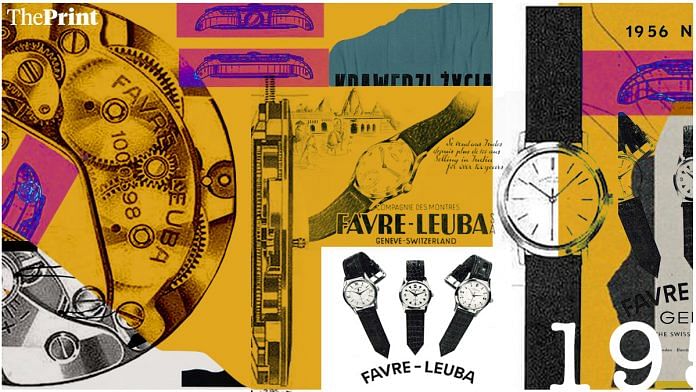New Delhi: Much before smartphones took over our lives, wrist watches were heirlooms passed down from one generation to the other, telling stories of aspirations and emotions. And Swiss watches figured as prominent symbols of this timeless tradition.
One such brand that enthusiasts were fascinated with was the 280-year-old Favre-Leuba, the second oldest Swiss watch company, which made its entry into the Indian market in 1865. The high-quality watches grabbed eyeballs, especially among the middle class in the 1960s, 70s and 80s.
But while the company did business in India for nearly five decades, the brand lost its charm in the 1990s and after, with newer, minimalist watches making their way and timepieces becoming obsolete with the rise of smartphones.
Favre-Leuba was started by Abraham Favre in 1737. But it was Fritz Favre, Abraham’s great-grandson, who travelled to India in the 1860s and launched the brand in the Indian market, right around the beginning of the British Raj.
“Favre-Leuba was the first Swiss watch brand to come to India, so it has a long relationship with India,” company CEO Thomas Morf was quoted as saying earlier, when he spoke about the brand making a comeback to Indian markets, after its sudden disappearance in the 80s.
Also read: From a rabbit selling ‘papad’ to a pug for phone network, these ‘warm’ ads brought us closer
Exit from India
Javed Hussain Khan, a watchmaker in his 60s, who has a shop in Delhi’s Nizamuddin, told ThePrint, “All the Swiss watch brands left India in 1975. Because of the state of Emergency during Indira Gandhi’s tenure, Swiss brands shut shop and a lot of smuggling of watches that used to happen earlier also stopped. Other than some larger brands like Omega or Rado, most Swiss watches stopped coming to India.”
Around the same time, the Indian government had also begun operations and promotion of the iconic watchmaker HMT, a public sector undertaking, in 1961. Swiss watches were further pushed out of the Indian market.
Making its way back to Indian consumers
But a different decade saw the comeback of Favre-Leuba. On 16 November, 2011, Favre-Leuba was acquired by the Tata Group and its company headquarters were moved to Zug, Switzerland. Buying the brand for around Rs. 13.8 crore, the Titan Company, which is part of the Tata Group, signed an agreement with Spain’s Valfamily SL and Switzerland’s Maison Favre Leuba SA to acquire global rights for the brand.
The official relaunch in India took place in 2016, when Favre-Leuba hit the shelves at select Ethos watch stores.
“Favre-Leuba has been non-existent in India for almost 40 years. Our objective was to launch this brand properly. It has a heritage attached to it,” Bhaskar Bhat, president of the board at Favre-Leuba AG and managing director of Titan previously, was quoted as saying.
While Titan did its best to reinvoke what the company thought would be the timeless spirit of Favre-Leuba, the subsequent years saw the watch die a slow death.
Trying to solidify the brand’s identity created decades ago, Favre-Leuba stuck to its old styles, and consequently the demand for these watches began to fall. While the older generation might have waited with bated breath for the brand to make its comeback, the younger generation did not take too well to the brand.
Kunal Gupta, programme director at the Delhi Literature Festival, who is also a watch aficionado, told ThePrint, “When the brand came back to India, its materials were just not good enough for its price. That, combined with its old and outdated designs, just did not make it a popular choice.”
Khan also noted how the watches were “extremely costly” when it was relaunched in India. “Moreover, it did not change with the times. People were steering toward more modern-looking watches. Even HMT for that matter changed its look and made it a little sharp to keep up with what the modern consumers wanted,” he added.
The Covid-19 pandemic finally spelled the death knell for the brand. In a regulatory filing in 2020, the Titan Company said it had been continuously supporting Favre-Leuba and made investments worth approximately Rs 275 crore for its revival and growth. But the current pandemic had severely impacted revival plans and prospects for the brand.
Titan also announced that it would be scaling down its Favre-Leuba operations. The same year, Titan had also announced the end of its five-year joint venture with Montblanc India Retail.
ThePrint had reached Titan’s PR team but they refused to give a comment on the issue.
Also read: Radio Ceylon — the Sri Lankan channel India turned to when AIR banned film music in 1952



